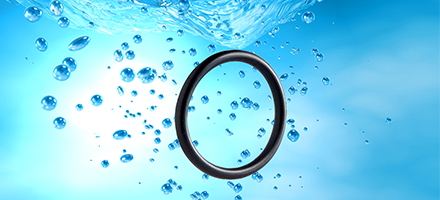Seals
There are two types of seals:
- Seals for static applications;
- Seals for dynamic applications.
The different sealing technologies are further divided into subcategories in our online shop; such as mechanical seals and rotary shaft seals.
Static and dynamic sealing products
Static sealing products are used in static, non-moving applications. The most popular products in this category are O-rings. If you want to buy an O-ring, you need to consider the dimensions of the groove where it will be seated and the material the seal is made of.
Dynamic sealing products are suitable for moving applications. Moving applications can be linear or rotational. Contrary to linear systems, where you would normally choose a cylindrical seal, such as an X-ring or a hydraulic seal, you will generally choose a double lip oil seal in the case of rotational systems, or a V-ring seal. Here again, you should always consider the dimensions of the groove where you intend to place your seal and the material the product is made of.
If you are not only looking for seals, but also other parts for your application, you will probably be able to find most of what you need in our online shop. For example, take a look at our vibration dampers.
Rubber seals
Most seals are made from rubber or PTFE materials. In our range, you will find an extensive selection of different materials such as EPDM, NBR (nitrile), HNBR, FKM (Viton), VMQ (silicone), FFKM (Kalrez®) and PTFE (Teflon®). These materials are the basis for a compound, i.e. a mixture of different material components that result in specific properties when combined.
Knowing the compound number makes it easy to choose the right product. However, you may not yet know which material you need. In that case, you can choose the right seal based on other criteria such as the temperature range, maximum pressure and resistance to chemicals. A brief summary of the different rubber materials is included below.
- NBR seals
Many seals are made from NBR, also referred to as nitrile. This rubber material is mainly used as a seal for hydraulic oils or lubricating oils. However, it is not able to withstand temperatures above +120°C and may not be exposed to UV radiation.
- EPDM seals
An EPDM seal is a highly effective sealing product for solvents, hot water and steam. All EPDM seals can withstand low temperatures (down to -50°C) and are resistant to UV radiation and ageing. Some compounds are also suitable for high temperatures (up to +150°C).
- FKM seals
FKM, commonly referred to by the brand name Viton, is a good solution for extremely high temperatures. To be more specific, this material can withstand temperatures up to +200°C. It also remains fully intact in contact with most acids and bases, but is not suitable for hot water or steam. Only a few FKM compounds are resistant to cold conditions (down to -40°C or lower).
- FFKM seals
You should use FFKM seals for very high temperatures and the strongest acids. Some compounds of this rubber-based material can withstand temperaturesof up to +327°C. Like FKM seals, only special types of FFKM work well in cold conditions.
- VMQ seals
VMQ is widely known as silicone and is very flexible. VMQ seals are resistant to both low (-60°C) and high (+200°C) temperatures.
- PTFE seals
PTFE, also known by the brand name Teflon, is highly resistant to strong acids and bases. This material is not wear-resistant, and unlike the elastomers mentioned above, also not elastic. So PTFE seals are only suitable for static applications.
- HNBR seals
HNBR (hydrogenated nitrile) is a variant of NBR that can withstand higher temperatures, namely up to +150°C. It is used to seal hydraulic, organic and lubricating oils. Furthermore, this material has good wear resistance.
If you require more information about the different rubber materials for seals and their fields of application, please refer to the more detailed overview on our materials page.
Ordering seals at ERIKS
What prices does ERIKS charge for seals?
The price of our seals is shown on the product pages. If the price is not immediately visible, it will be displayed after you have logged in.
What delivery times does ERIKS offer for seals?
The delivery time for a specific seal is indicated on the page for that product. If you require a product more quickly, we advise you to choose a suitable alternative. You have several options:
- If you want to order an O-Ring or a double lip oil seal, choose a slightly different size that also works in your application. For O-rings, you can use the O-ring selector to find an alternative.
- As an alternative for all seals, you can choose a different material that also works in your application.
- Use our quick-supply solutions, such as the SealXpress service, for O-Rings, hydraulic seals and double lip oil seals.
If you need help finding a good alternative, please contact us via the enquiry form.
What kind of seals does ERIKS offer?
ERIKS is the leading specialist in the field of industrial seals. You can find seals for every possible industrial application in our range. We help you by offering extensive and highly specialised ranges for equipment used in the food, pharmaceutical, semiconductor, chemical, petrochemical, mechanical engineering, HVAC and drinking water sectors. In addition, we can provide more than 60 sealing material approval certificates, ranging from EC1935/2004 to KIWA.
Can I order custom seals?
Are you looking for a seal of a different size, shape, colour or material? Or do you need a seal for a special application, or one that meets specific certification requirements? Let us help - contact us via the enquiry form.








